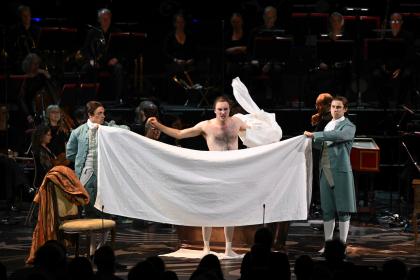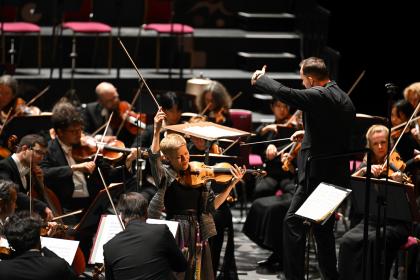Classical Music reviews, news & interviews
BBC Proms: Alexander’s Feast, Irish Baroque Orchestra, Whelan review - rapturous Handel fills the space
Sunday, 31 August 2025
Many Londoners would already have experienced the musicality incarnate of Peter Whelan and his Irish Baroque Orchestra. A smaller ensemble rocked two of Irish National Opera’s Vivaldi specials in the Linbury Theatre – one a major award winner – and the best Messiah I’ve ever heard in the Wigmore Hall. Their first Prom was pure celebration, and how they filled the Royal Albert Hall, both collectively and solo-wise, in the revised Dublin version of Alexander’s Feast.
BBC Proms: Moore, LSO, Bancroft review - the freshness of morning wind and brass
Sunday, 31 August 2025
11am concerts do take some getting used to. The BBC Proms season has no fewer than seven of them this year, three on Saturdays and four on Sundays. And yet, strangely, for this programme, mainly consisting of works for concert band, it did genuinely seem like the right time of day.
Subscribe to theartsdesk.com
Thank you for continuing to read our work on theartsdesk.com. For unlimited access to every article in its entirety, including our archive of more than 15,000 pieces, we're asking for £5 per month or £40 per year. We feel it's a very good deal, and hope you do too.
To take a subscription now simply click here.
And if you're looking for that extra gift for a friend or family member, why not treat them to a theartsdesk.com gift subscription?
Footnote: a brief history of classical music in Britain
London has more world-famous symphony orchestras than any other city in the world, the Philharmonia, Royal Philharmonic, London Philharmonic and London Symphony Orchestra vying with the BBC Symphony Orchestra and Royal Opera House Orchestra, crack "period", chamber and contemporary orchestras. The bursting schedules of concerts at the Wigmore Hall, the Barbican Centre and South Bank Centre, and the strength of music in Birmingham, Manchester, Leeds and Cardiff, among other cities, show a depth and internationalism reflecting the development of the British classical tradition as European, but with specific slants of its own.
brittenWhile Renaissance monarchs Henry VIII and Elizabeth I took a lively interest in musical entertainment, this did not prevent outstanding English composers such as Thomas Tallis and William Byrd developing the use of massed choral voices to stirring effect. Arguably the vocal tradition became British music's glory, boosted by the arrival of Handel as a London resident in 1710. For the next 35 years he generated booms in opera, choral and instrumental playing, and London attracted a wealth of major European composers, Mozart, Chopin and Mahler among them.
The Victorian era saw a proliferation of classical music organisations, beginning with the Philharmonic Society, 1813, and the Royal Academy of Music, 1822, both keenly promoting Beethoven's music. The Royal Albert Hall and the Queen's Hall were key new concert halls, and Manchester, Liverpool and Edinburgh established major orchestras. Edward Elgar was chief of a raft of English late-Victorian composers; a boom-time which saw the Proms launched in 1895 by Sir Henry Wood, and a rapid increase in conservatoires and orchestras. The "pastoral" English classical style arose, typified by Vaughan Williams, and the new BBC took over the Proms in 1931, founding its own broadcasting orchestra and classical radio station (now Radio 3).
England at last produced a world giant in Benjamin Britten (pictured above), whose protean range spearheaded the postwar establishment of national arts institutions, resulting notably in English National Opera, the Royal Opera and the Aldeburgh Festival. The Arts Desk writers provide a uniquely rich coverage of classical concerts, with overnight reviews and indepth interviews with major performers and composers, from Britain and abroad. Writers include Igor Toronyi-Lalic, David Nice, Edward Seckerson, Alexandra Coghlan, Graham Rickson, Stephen Walsh and Ismene Brown
inside classical music
The future of Arts Journalism
You can stop theartsdesk.com closing!
We urgently need financing to survive. Our fundraising drive has thus far raised £49,000 but we need to reach £100,000 or we will be forced to close. Please contribute here: https://gofund.me/c3f6033d
And if you can forward this information to anyone who might assist, we’d be grateful.

latest in today
 'We are bowled over!' Thank you for your messages...
'We are bowled over!' Thank you for your messages...















































